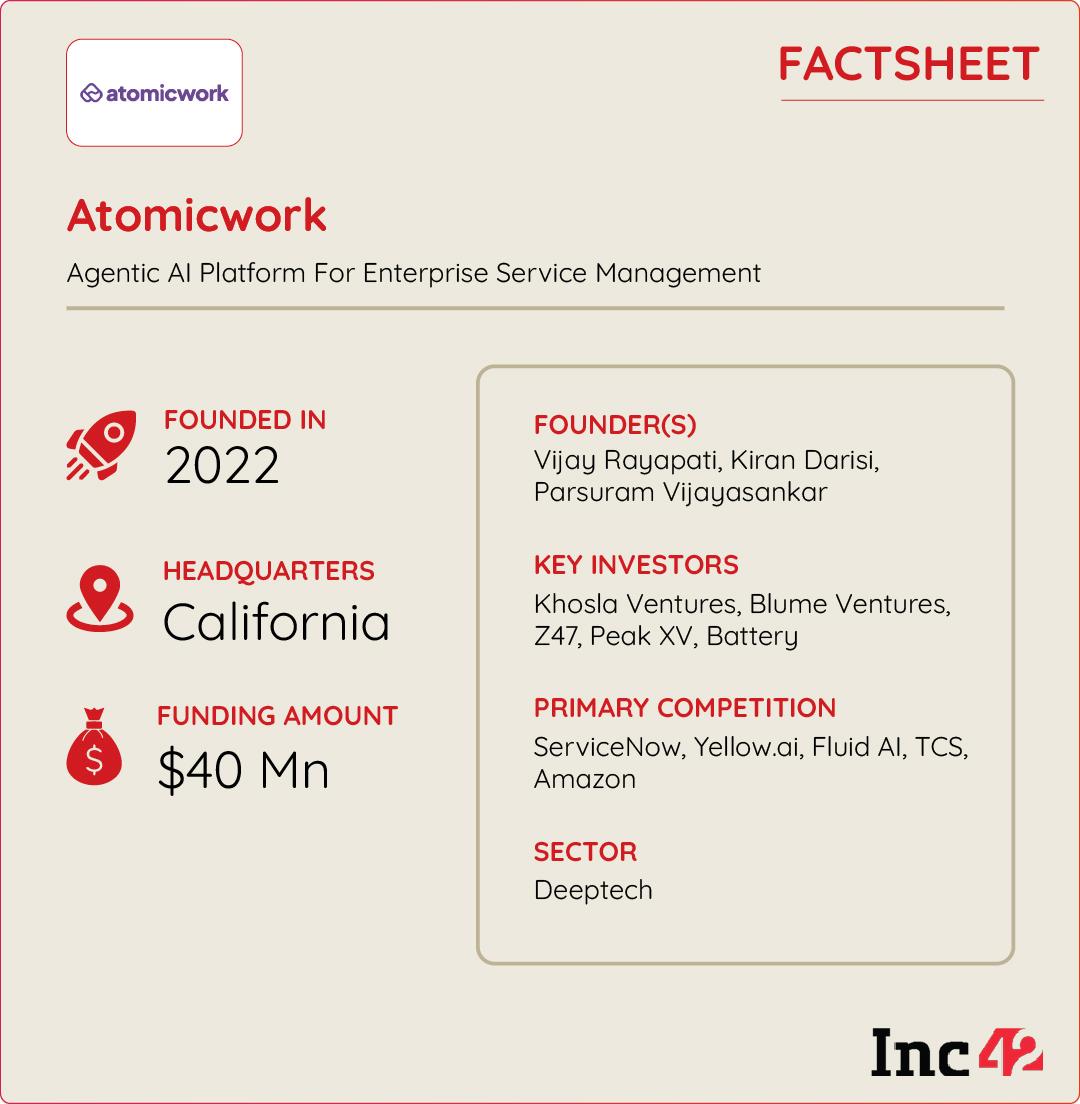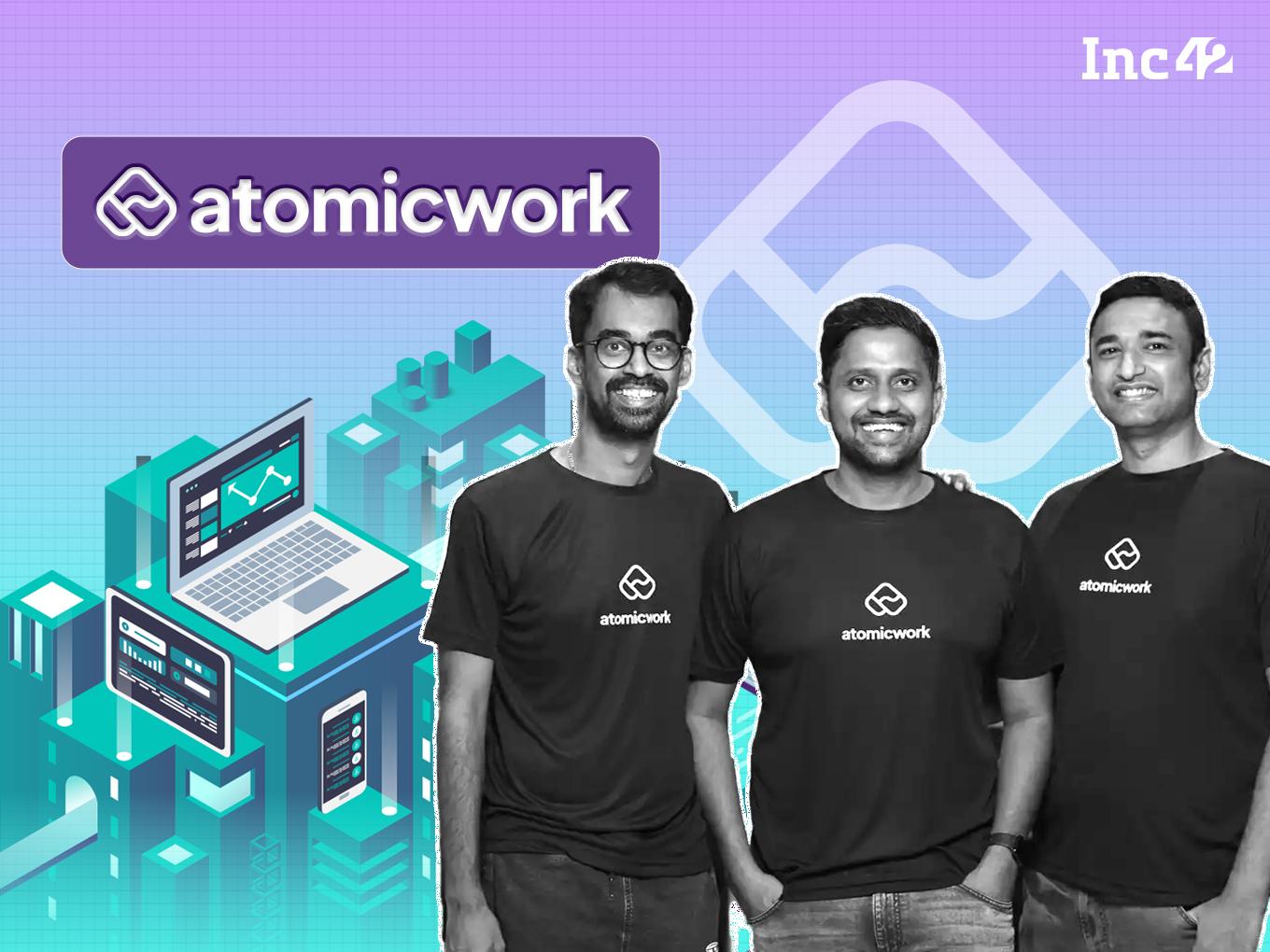Atomicwork is building AI-powered tools for enterprises to help them automate and streamline internal workflows
The startup has built an Agentic AI platform, Atom, which can be integrated with platforms like Microsoft Teams, Slack, Jira, Salesforce, Google Drive, and WordPress to ensure end-to-end problem-solving for enterprises and their employees
Atomicwork has built an ensemble AI architecture, which is a fusion of AI models
In large enterprises, employees often struggle with internal workflows — be it tech glitches, onboarding hiccups, task delays, or a lack of timely support. These seemingly small problems can snowball into lost time and reduced productivity.
This is where there’s a growing need for smart, automated solutions that can take care of critical internal tasks quickly, efficiently and with minimal human involvement.
Founded in 2022 by Vijay Rayapati, Kiran Darisi and Parsuram Vijayasankar, Atomicwork
Atomicwork’s endeavour is in sync with today’s enterprise needs — the ones related to exploring AI products, especially autonomous AI agents, to automate internal workflows like tech support, onboarding, task management, and more.
According to a report, 33% of enterprise software applications will include agentic AI by 2028. Besides, at least 15% of daily work decisions would be made autonomously through agentic AI.
Atomicwork aims to capture a large portion of this growing market with its voice and vision AI agents for enterprise IT teams.
Since its inception, it has raised $40 Mn to fund its technology development, hiring, and global customer acquisition. It is backed by marquee investors, including OpenAI-backed Khosla Ventures, Blume Ventures, Z47, and Peak XV.

Laying The First Bricks Of Atomicwork
While Rayapati is a second-time entrepreneur, who sold his previous startup Minjar to Nutanix in 2018, Darisi and Vijayasankar were part of the founding team at Freshworks.
Having previously built software for developers and small and medium businesses, the trio joined hands to develop solutions that can help enterprises solve complex workflow challenges. This led to the creation of Atomicwork.
After its inception in 2022, the founders spent a year building a base platform. During this time, they were experimenting with AI and working on customer acquisition plans. In 2024, Atomicwork started full-fledged deployment of its platform with large enterprises.
“In any business, people use various tools and follow set processes to deliver a product or service. But along the way, they often face issues — usually due to lack of knowledge, insufficient training, or simply not reading the documentation. That’s where automation can step in and make a real difference,” the founders said.
Rayapati said Atomicwork solves this problem end-to-end for enterprises so that their businesses can operate much faster and they are not required to integrate 10 different tools to get basic help.
The startup has built an Agentic AI platform, Atom, which can be integrated with platforms like Microsoft Teams, Slack, Jira, Salesforce, Google Drive, and WordPress to ensure end-to-end problem-solving for enterprises and their employees.
As per Rayapati, Atomicwork is solely focussed on internal workflow challenges at enterprises because they are harder to solve than external and customer-facing issues.
Its Agentic AI platform includes tools such as AI Agents, AI Copilot, AI Skills, AI Search, AI Assistant, and AI Service Desk.
Though the founder did not reveal its total customer base, it serves some of the top global organisations across sectors such as financial services, healthcare, manufacturing, and education. Some of its top customers include Zuora, Pepper Money, and AMMEX.
Atomicwork’s Fusion Of AI Models
Atomicwork hasn’t built any proprietary large language models (LLMs). It rather does context engineering and distillation of the already available models to build small language models (SMLs) that can decide on the action based on specific use cases.
For instance, its AI agent with video capabilities is a combination of Google’s Gemini and OpenAI’s GPT models. Similarly, for chat support use cases, it has used a combination of Llama and OpenAI models. Atomicwork also uses Anthropic and Cohere for a few other use cases.
“We are building what people typically call, in technical language, an ensemble AI architecture, which is a fusion of AI models,” explained Rayapati.
The startup has developed its own proprietary datasets over the years, which it uses to train its AI models.
The founder clarified that Atomicwork doesn’t do fine-tuning of models but rather prefers distillation, which is more cost-effective as GenAI models are changing almost every week.
As per a Google blog, fine-tuned models are usually better in predictions than the foundation LLMs, but they contain the same number of parameters as the foundation LLM. On the other hand, distillation creates a smaller version of an LLM, and the distilled LLM predicts much faster with fewer computational and environmental resources compared to the full LLM.
Atomicwork doesn’t customise its products and tools for every enterprise. While companies can choose to customise a bit as per their requirements, the platform doesn’t need a full customisation that SaaS products traditionally required.
It charges an enterprise with 1,000 employees an average amount of $100,000 per year. The startup began generating revenue in 2024. It has, however, refrained from sharing its earnings.
Forging Ahead Amid Global Competition
Going ahead, the founders want to create the next platform of choice for CIOs. They also want to expand their customer base from a few dozen customers right now to hundreds of customers soon.
“We want to achieve our first $100 Mn revenue goal as soon as possible,” Rayapati said.
However, the competition is getting tougher. While the startup has its eye on beating ServiceNow, a cloud-based platform that helps businesses automate and manage workflows across various departments, the enterprise AI market is slowly seeing the emergence of many companies, big and small.
Even IT giants like Wipro, TCS and Amazon have built their own platforms. However, Rayapati believes that service companies can never become product companies even with AI.
Moreover, as AI adoption grows among Indian enterprises, Atomicwork sees a strong opportunity in the market. According to the founder, no one in India is currently building true enterprise-grade SaaS products.
“In India, Darwinbox is trying to build a true enterprise SaaS on the HR side, like we do for IT teams. I don’t think anybody else in the country is really targeting the global market building for the enterprises,” said Rayapati, urging Indian founders to target sectors dominated by legacy players.
“Go create AI native and AI at core software platforms. I think a massive opportunity is there, and that is how we create these billion-dollar revenue and tens of billions of dollars market cap companies. If you create simple use cases and applications… that kind of SaaS is dead,” Rayapati added.
As of now, while Atomicwork’s vision to become a CIO’s go-to platform sounds compelling, the path ahead is anything but straightforward. Enterprise software is a tough game. The challenge gets even steeper when you’re going up against global giants that have been around for decades. Amid this, can Atomicwork take on the big guns?
[Edited By Shishir Parasher]




 Fintech
Fintech Travel Tech
Travel Tech Electric Vehicle
Electric Vehicle Health Tech
Health Tech Edtech
Edtech IT
IT Logistics
Logistics Retail
Retail Ecommerce
Ecommerce Startup Ecosystem
Startup Ecosystem Enterprise Tech
Enterprise Tech Clean Tech
Clean Tech Consumer Internet
Consumer Internet Agritech
Agritech
































